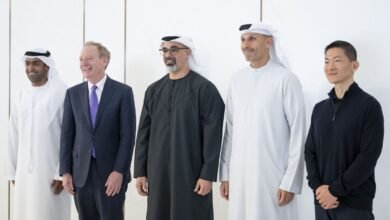Indonesia, UAE Partner on Digital Governance & Human Capital

▼ Summary
– Indonesia and the UAE have signed an agreement to enhance government services by exchanging expertise and adopting advanced technologies, strengthening bilateral ties.
– The partnership focuses on fostering innovation, improving government performance, and accelerating technology adoption, including a flagship initiative to train 10 million Indonesian coders over three years.
– The 10 million coders program, supported by the UAE, aims to equip Indonesian youth with skills in software development, programming, and AI for future digital economies.
– Collaboration extends beyond digital governance to include food security, with Indonesia seeking UAE support to boost agricultural productivity and market access for local products.
– Indonesia’s Supreme Audit Board and the UAE Accountability Authority agreed to deepen cooperation in auditing, anti-corruption, and IT oversight to strengthen governance transparency.
Indonesia and the United Arab Emirates have solidified a landmark partnership aimed at advancing digital governance and human capital development through shared expertise and cutting-edge technology. This collaboration represents a major milestone in bilateral relations, with both nations committing to drive innovation, improve public services, and build a skilled workforce ready for the digital age.
Central to the agreement are five strategic pillars: fostering innovation, enhancing national competitiveness, improving government performance, upgrading service delivery mechanisms, and accelerating the adoption of emerging technologies. A standout feature of this cooperation is the ambitious plan to train 10 million Indonesian coders over the next three years, a program fully backed by Emirati support. This initiative is designed to arm young Indonesians with essential skills in software development, programming, and artificial intelligence, ensuring they are well-prepared to thrive in increasingly digital global economies.
Nezar Patria, Indonesia’s Deputy Minister of Communications and Digital Affairs, emphasized that this effort involves multiple government ministries and is being streamlined with significant assistance from the UAE. He highlighted how the program will contribute to more effective and responsive governance. From the Emirati side, Deputy Minister Abdulla Nasser Lootah noted that this coding initiative stands as the largest digital skills program ever launched by the UAE government, reflecting its scale and strategic importance.
The partnership builds on recent high-level diplomatic engagement, including Indonesian President Prabowo Subianto’s official visit to the UAE on September 12. During meetings with President Mohammed bin Zayed, both leaders reinforced their dedication to expanding ties across technology, innovation, and human resource development. Beyond digital transformation, the two countries are also collaborating in areas like food security, where Indonesia aims to leverage Emirati expertise and investment to boost agricultural productivity and improve international market access for local produce.
In a parallel development, Indonesia’s Supreme Audit Board (BPK) and the UAE Accountability Authority (UAEAA) have agreed to deepen their cooperation in auditing practices, anti-corruption measures, IT oversight, and institutional capacity building. This alignment is expected to foster greater transparency and strengthen governance frameworks in both nations.
This wide-ranging partnership underscores a mutual commitment to sustainable and inclusive growth. By uniting efforts in digital transformation, technological innovation, food security, and public sector accountability, Indonesia and the UAE are laying the groundwork for a resilient and forward-looking alliance, one that positions them as influential players in the realm of international tech-driven cooperation.
(Source: MEA Tech Watch)





